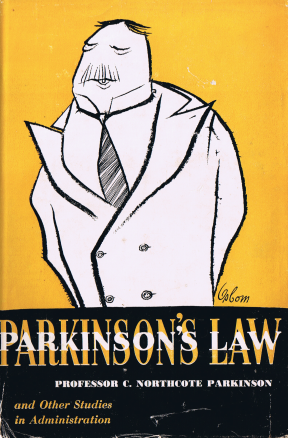Yesterday I found a copy of Parkinson’s Law for $1 at a library book sale. This book is best known for it’s opening line: Work expands so as to fill the time available for its completion.

The name “Parkinson’s law” can mean at least four different things:
- The 1957 book by C. Northcote Parkinson
- The first chapter of Parkinson’s book
- The principle expressed in the book’s opening line, as understood by Parkinson
- The principle in the opening line as understood today.
I’d heard of the general principle of Parkinson’s law a few years ago. I only found out about the book more recently. I didn’t know until last night that Parkinson intended his principle to be applied more narrowly than it is applied now.
The full title of the first chapter of the book is “Parkinson’s Law, or The Rising Pyramid.” This chapter explains how work expands to fill the available resources within a bureaucracy and why bureaucracies grow exponentially at a compounding rate of around 5% per year. The subtitle addresses the mechanism for this growth, bureaucrats creating a pyramid of subordinates. Parkinson derives his law from “two almost axiomatic statements”:
- An official wants to multiply subordinates, not rivals.
- Officials make work for each other.
Nowadays Parkinson’s law is usually condensed to saying work expands to the time allowed. It is applied to individuals as well as a burgeoning bureaucracies. Parkinson discusses this interpretation in his opening paragraph but then limits his attention to organizations.
The total effort that would occupy a busy man for three minutes all told may in this fashion leave another person prostrate after a day of doubt, anxiety, and toil.
Chapter 3 of Parkinson’s law is “High Finance, or The Point of Vanishing Interest.” This chapter is the source of the phrase bike shed arguments. In this chapter Parkinson states what he calls the Law of Triviality:
… the time spent on any item of the agenda will be in inverse proportion to the sum involved.
The idea is that people are more likely to contribute to the discussion of things they understand. A nuclear reactor will sail through the finance committee, but a bicycle shed will cause endless debate because everyone can understand it and everyone has an opinion.
I picked up a copy of Mrs. Parkinson’s Law at the same book sale, also for $1. I’d never heard of it before, but I imagine it will be entertaining.

I’ve also found that my monthly expenditures will expand so as to use up all of my income, and that my clutter will expand so as to fill up my available space.
@Bill: That reminds me of what someone told me about cost of living. When asked how much it costs to live in some city, he said “Same as anywhere else: all you make.”
@Bill
Expenditure expands to meet income:
Parkinson’s Second Law: see The Law and the Profits by C. N. Parkinson
You should also look for his biography of Horatio Hornblower, treating the fictional character as if he were historical.
My favorite principle from CNP was that when an enterprise constructs its own headquarters, its demise follows not long after. It was with foreboding that I moved into our new digs and, sure enough, two years later the entire outfit went ‘poof’ in the biggest bank failure yet.
I just Read Hour Work Week and talks of this principle and others. Gonna hunt this book out.Cheers
Daniel Morris
Great post. I always assumed that bikeshedding came as an expression out of the software industry.